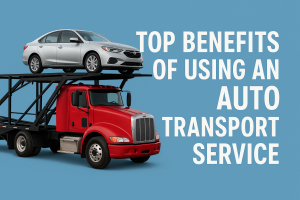Every October, the snowbirds return to the warm, Southern climates, and each May they depart. You can almost gauge the changing of the seasons by the number of auto carriers on the road. It’s like observing the cliff swallows of San Juan Capistrano.
Whether you’re a snowbird traveling or moving from Colorado or Arizona to California, or a native New Yorker heading to Tampa for the winter months, or perhaps you just purchased the vintage car of your dreams online across the country, you are going to intersect with the Auto Transport industry. IBIS World, a market research company that provides reports on thousands of industries worldwide, pegs the Vehicle Shipping Services market at some $12 billion annually. That is big business, and there is a myriad of providers, over 4,500 per IBIS World.
Before shipping your vehicle, whether it’s cross country or across the state, it will help to educate yourself on the intricacies of auto transport to make your experience less stressful and more economical.
In this “What You Need to Know” article, we will address pertinent details such as:
- An overview of the relationships in your car’s move, broker versus carrier
- Delivery options, terminal or door-to-door
- The type of transport, open, closed, or flatbed
- Insurance, who’s responsible
- Rates and fees strategies, with sample costs for popular routes
- Estimated delivery times
- Preparing your car for transport
- Verifying your provider’s credentials, the importance of the MC Docket Number
- And, much more
Once you do some research, you will see that choosing the right company for your transport can make all the difference.
Broker vs Carrier – Roles and Responsibilities
Auto brokers and auto shippers serve different roles, and it’s crucial to know the difference when looking for vehicle transport services.
Auto Transport Brokers
Transport brokers do not ship vehicles. Rather, they charge a fee and find the appropriate carrier for you. Brokers have access to a wide range of car transporters through National Dispatch Boards and can often negotiate a far better rate than you could find on your own. Choosing the right broker is vital to getting a reputable carrier for the lowest price possible. Not all brokers are created equal in this talent.
Quality transport brokers do a thorough background check with each carrier for every shipment. They verify their ratings, references, and obtain a certified copy of their insurance certificate, and ensure they are licensed with FMCSA (Federal Motor Carrier and Safety Administration).
Even with the fee they charge, using a broker saves people money. Because of their flexibility in choosing from several carriers, going with an auto transport broker also tends to result in a quicker pickup than you could get when calling an individual carrier.
Auto Transport Carriers
Auto transport carriers do the actual work of picking up your vehicle and delivering it to your chosen destination. They are on the road and don’t have the time or resources to interact directly with customers, and so they rely on auto transport brokers to find work.
In addition to negotiating rates and timing on your behalf, your broker is responsible for verifying the carrier’s ratings, references, and securing a certified copy of their insurance certificate.
The above explains the crucial role of the broker as your representative and intermediary in this transaction. Choosing the right transport broker is vital.
When shipping your vehicle, it’s essential to consider the available services that best suit your situation. There are several options to choose from when transporting your vehicle:
Vehicle Pickup and Delivery Options
You have two distinct options for vehicle pickup and delivery. Cost and convenience will determine which choice is right for you.
Door-to-Door Shipping
Door-to-door transport offers greater convenience, the carrier’s driver picks up the vehicle at your home and drops it off at your chosen destination. Note: some locations are inaccessible for carriers who cannot navigate narrow neighborhood roads, you may need to compromise and set up a delivery point close to your destination. In addition to being more convenient, door-to-door also costs less when you consider terminal and storage charges in terminal-to-terminal shipping.
Terminal-to-Terminal Shipping
In terminal-to-terminal shipping, you drop off your vehicle at a pre-designated terminal, and the driver transports it to the terminal nearest to your vehicle’s destination – less convenient than door-to-door, and more expensive. We suggest you use terminal-to-terminal only when necessary.
Read our article “Comparing Door-to-Door and Terminal-to-Terminal Car Shipping” to learn more.
Type of Auto Transport
One of the first things you’ll need to consider when hiring a professional vehicle shipping service is whether you want your vehicle to travel in an open carrier or a closed carrier.
Open Transport Carriers
Open auto transport carriers are considered the standard carrier in the industry today. These steel skeleton carriers have no roof or siding to protect your vehicle from the elements, making this a less-than-ideal choice for classic or luxury cars.
Read our article “What is Open Auto Transport? (The Cheapest Car Shipping Option)” to learn more.
Enclosed Transport Carriers
Not as readily available as open transport carriers, these enclosed auto transport carriers are the upper echelon of transporters. We generally recommend enclosed transportation services for luxury cars, exotic vehicles, sports cars, and restored classics.
Related articles:
- How Much Does Enclosed Auto Transport Cost? + Pros and Cons
- Reasons You Might Need Enclosed Auto Transport
Flatbed Carriers
Flatbed auto transport carriers are the least used of the three types. These carriers haul anything that can’t fit or can’t be loaded onto a standard open auto transport carrier. Because there are so few available Flatbeds, they tend to be more expensive.
Read our article “3 Vehicle Carrier Options: The Differences Between Open, Enclosed, and Flatbed Transport” to know more about the difference between these auto transport carriers.
Insurance – Who’s Responsible
The insured carrier doing the actual shipping should include insurance in their quote. Determine in advance if their insurance is primary or secondary to yours. Also, in advance of shipping, check with your automobile insurance company to determine if they cover any damages that shipping might incur. Finally, find out if the shipping company’s insurance comes with a damage deductible and keep written copies of everything in the event of an accident. You accept the carrier’s terms by releasing the vehicle to their possession.
The Important Stuff – Rates and Fees
Transport prices are based on seasonal market demands for cars to be moved at any given time. Each quote is prepared based on the season and the current national rates. An experienced broker will work with you and will strategize to develop an appropriate price to offer carriers to meet your requirements.
Strategizing Offer Prices
The Auto shipping industry is an open market system, much like a bidding system such as eBay. Understand, when talking to brokers, there is no fixed, final, or guaranteed price until your broker locates a carrier for you. Usually, the lower you are willing to offer, the more time it takes to get picked up, and conversely, the higher you are ready to offer, the less time it takes to get picked up.
Lead time is important, the more time you have until your car needs to be transported, the more money you can save. The best transport brokers will have a strategy such as “name your price” to develop an initial offer considering the various timing variables. They start negotiations with a lower offering to their carriers seeking the most cost-effective rates, and increase the offer little by little, as needed.
Another strategy used by best-in-class brokers is standby mode. This approach allows a carrier to fill an empty spot with your vehicle as a filler. If one of their loads gets canceled, your vehicle will move up in the available load list. This both saves you money and helps the driver to get a full load.
As to broker fees, never pay a fee until you have a signed agreement, and the carrier is en route to pick up your vehicle. There should never be any hidden broker fees when dealing with a reputable broker. Seek a broker with a fair and relatively simple to understand all-inclusive fee structure that covers door-to-door service, tax, tolls, fuel, and insurance coverage. We reiterate, there should be no money down, no hidden charges, and no cancellation fees.
To provide you with some idea of transportation costs, below are some examples of typical fees for popular destinations:
| FROM | TO | ESTIMATED COST |
| California | Phoenix | $ 561 |
| Chicago | Phoenix | $ 883 |
| Phoenix | Denver | $ 699 |
| New York | Tampa | $ 850 |
| Chicago | Tampa | $ 875 |
Estimated Delivery Times
Delivery times are a function of distance. Our standard rule of thumb is as follows:
- 0-500 Miles:1-2 Days
- 501-1,000 Miles:2-3 Days
- 1,001-1,500 Miles:3-5 Days
- 1,501-2,000 Miles:4-7 Days
- 2,001-2,500 Miles: 7-10 Days
- 2,500+ Miles:10-14 Days
Time frames are subject to some deviation due to potential weather or other road circumstances. That said, shipments are typically on time, and there is always communication with the carrier.
Preparing Your Car for Transport
Some useful tips for preparing your car for its journey.
Clean out the Car
Remove all personal belongings from the vehicle to protect your privacy and proprietary information. Don’t forget to remove all digital accessories, and any valuables, and disable your alarm system. You should also remove after-market accessories such as removable luggage containers and bike or equipment racks on your vehicle.
Inspect Your Car Before Shipping
Make a note of the vehicle’s mileage and condition, including scratches in the paint, and get the driver to write them down on the moving documents. Take a few photos before and after your car is shipped in case you need to file a claim for any damages that occur during transport. In the unlikely event that your vehicle is damaged, it’s important to note it on your final bill of lading report.
Verify Your Provider’s Credentials
As you develop your list of prospective providers, we suggest the following steps to validate their credentials and credibility:
- Contact each company, acquire their full legal name and any (DBA) Doing Business As names
- Research how long they have been in business
- Review testimonials and referrals
- Check the Better Business Bureau for complaints
The MC Docket Number
Finally, we recommend you not engage with any company that does not prominently display their MC Docket number and US Department of Transportation number on their website.
Mercury Auto Transport
As we stated in this article’s introduction, once you do your research, you will see that choosing the right auto transport broker can make all the difference. We provide this unbiased report to help educate you, the customer, on eliminating the stress from your vehicle’s transport journey.
As an auto transport broker, we want you to be armed with the knowledge to understand the relationships in our business, important considerations in planning your car’s move, and a strategy for negotiating fees and services. We’re sure once you have this knowledge and see how Mercury Auto Transport stacks up versus our recommendations and the competition, the choice will be natural.
Here’s a quick checklist to illustrate our capabilities, credibility, and credentials:
Relationship: Broker – with over 13,000 carrier options on the National Dispatch Boards
Delivery Options: Door-to-Door or Terminal-to-Terminal
Type of Auto Transport: Open, Enclosed, or Flatbed Auto Transports
Insurance: Only work with licensed and insured carriers
Rates and Fees: Proven negotiating strategies to enable our customers – Name Your Price and Standby Mode features delivery
Delivery Times: Industry standards
Credentials:
- In business since 2007 – over 218,000 satisfied customers
- Our reviews are paramount for our success
- Excellent Better Business Bureau rating
- MC Docket # 647319
- US DOT # 2242305
Feel free to call us today at 800-553-1828 or get a free quote to plan your next move.






